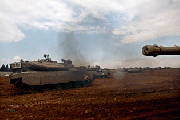
|
|
Israeli tanks move just outside the northern Gaza Strip December 29, 2008. Israeli aircraft attacked Hamas targets in Gaza on Monday, the third day of an offensive that has killed more than 300 Palestinians, many of them civilians. Hamas defied the strongest assault against Palestinian militants in decades by launching a rocket attack on Israel that killed one person, the second such fatality since Saturday. REUTERS/Ronen Zvulun |
The root causes of the conflict are in the occupation: the Gaza siege, the exclusion wall in the West Bank , the several hundred check points, the economic deprivation, the bulging prisons, the assassination of leaders, the expanding Israeli settlements and above all, the humiliation of the Palestinian people.
If Israel intends to control Hamas through sheer force it has failed. Hamas and the people of Gaza are soaking up the sympathy of the Arab and Muslim world with each day the war progresses and the suffering of the innocent mounts.
On the third day, the record shows 300 air strikes pounding neighborhoods of a crowded strip of land. Since December 27, over 350 people have died and about 1,400 have been injured. To describe the bombing as “accurate” is unreasonable, given the heavy density of Gaza . Israel threatens to expand the operation to include a land invasion.
The assault on Gaza alarms the Arab world. Clovis Maksoud, the former Arab League Ambassador to the UN, urges Arab states to sever diplomatic relations with Israel . Jordanian lawyers march in the streets asking for the expulsion of the Israeli Ambassador in Amman . In London and other cities around the world anti Israeli demonstrations are spreading. Young men in all Arab capitals display the same sentiment: inflamed anger toward Israel and the US , desperate acts of revenge, accusations of co-opted Arab regimes and praise for resistance to the occupation.
No Arab could tolerate the victimization of civilians; Gaza people have already suffered enough from the poor governance of Hamas and from the cruel Israel blockade that has been imposed, albeit in stages, since Israel evacuated the strip in 2005.
The attack on Gaza has unified Palestinian sentiment and gained some support for the Palestinian cause internationally. The five million Palestinian refugees identify closely with the community of Gaza . In the refugee camps of the West Bank, Lebanon , Syria and Jordan and in the squalor and human deprivation of Gaza lies the collective conscience of the Palestinians. During times of confrontation with Israel Arabs listen intently to the voice of the refugees.
Despite the unity of sentiment against the occupation, Palestinians remain divided into two rival factions: The Palestinian Authority rules the West Bank and Hamas rules Gaza .
This war has weakened the Palestinian Authority, which seeks peace without solid representation. And moreover, this war has strengthened Hamas, which carries the torch of resistance without discipline or sufficient respect for life, particularly Palestinian life.
The Israeli military adventure in Gaza is likely to have unintended consequences. The painful lessons of the 1982 invasion of Lebanon and the 2006 war with Hezbollah are ignored in today’s assault on Gaza .
Israeli policy makers should realize that continuing the Israeli policy of hurting Palestinian civilians collectively leaves psychological scars that are hard to erase with time. The deeper the Palestinian wound, the longer Israel will have to wait for peace.
Only a united, rehabilitated, healed and viable Palestinian community can give Israel the security it desperately seeks. Yet Israel insists on achieving security through use of force.
Only a free and economically prosperous Gaza would allow the people of this community to reconsider their relations with Israel . Yet Israel rejects the authority of an elected Hamas government, and imposes a siege that turns Gaza into a prison environment.
Today, Israelis are executing a war and campaigning for national elections simultaneously. The war is taking place as the Arab world is exhausted and demoralized. It is too early to figure out how this war will end, how it will impact the Israeli elections, how much it will negatively impact US-Arab relations and how the Arab states can survive another Israeli attack without facing a political rupture in one or more of their most vulnerable regimes.
Contrary to Israel ’s designs, Hamas is likely to gain legitimacy and political strength when the dust of this war settles.
Dr Ghassan Michel Rubeiz is an Arab American commentator with special interest in the promotion of Arab-American relations. He is the former Secretary of the Middle East for the Geneva-based World Council of Churches. His email address is: grubeiz@comcast.net






Leave a Reply